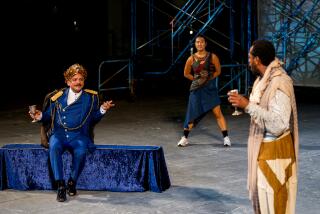Growing Into a New Part : Aging: Actor Jack Lemmon is honored for going beyond the stereotypes to portray an elderly man. He says the role taught him lessons about growing older.
- Share via
Jack Lemmon was overjoyed about becoming old before his time for a role. With thinning, white hair, a shuffling walk, raspy voice and diminishing health, he faced illness and death.
The 65-year-old veteran actor aged a couple of decades in a matter of hours for his role in the 1989 film “Dad,” playing Jake Tremont, an old man dealing with the realities of the sometimes not-so-golden years.
Besides nods from film critics, the role has earned Lemmon the Rose Media Achievement Award from the Reseda-based Jewish Homes for the Aging, a nonprofit organization that cares for elderly Jews in the Los Angeles area on two campuses in the San Fernando Valley. (The award is named for Rose Solomon, actress Marlee Matlin’s late grandmother, who was a resident of one of the Jewish Homes for the Aging.)
Lemmon will receive the award at a dinner-dance Tuesday at the Four Seasons and as the ceremony neared, he reflected on growing older and what he learned about aging from the role.
While “Dad” wasn’t a glamorous role it was what Lemmon calls a “rich” one. He credits the film’s makeup artists for giving him the physical characteristics of an balding, wrinkled, liver-spotted man. But the rest was up to Lemmon.
“I think there’s a trap in playing an older person, that you just say, ‘Oh, I’ll play old,’ ” he says while sitting in his office across from the William Morris Agency. “You don’t play old. Old is a state of being. In many ways he was very young. The biggest problem I had was in movement. I have a lot of nervous energy, and I’m using my hands and my face when I don’t know it. So I tried to put him in a straitjacket in a way and confine his movements, and also make him slow.
“There is no stereotype of an old person. I wish I had one--it makes it easier. You can tell the way someone walks that they’re old, but there’s a hundred different ways old people can walk. When I was a kid starting out in New York and the subways were only a nickel, you’d get in them and ride for hours to kill time. I remember studying old people then. One thing I noticed that really struck me was the eyes, and whether or not they were dead. You can tell very often if someone has lost the capacity for excitement, caring, whatever. They’re existing.”
The makeup, he adds, “did help enormously. My voice started to change; it got lower, a little huskier, thinner. And when I had the makeup on, nobody knew who I was. They couldn’t believe it was me. . . . And people would treat me with deference. There would be less of a tendency for people to slap me on the back and say, ‘How are you, you old son-of-a-gun?’ They would be a little gentler. Even guys on the crew, who saw me practically only in makeup, would set out chairs for me. That had never happened before.”
Lemmon’s portrayal of Jake Tremont was accurate enough for Sheldon Blumenthal, CEO of Jewish Homes for the Aging, and his staff, to choose Lemmon for the media award.
“I thought the film was absolutely incredible,” says Blumenthal. “My first reaction was that I felt like I was at work. I saw it once, then again with my staff, and had we talked about it, about what we learned from the movie, how could we use this to react with the spouses and children of our residents. It was a very real portrayal of the problems a family has with an aging parent.”
He cites Lemmon’s role as one that “didn’t make old people good or bad; it just made them real.”
“Jack touched a nerve in people, and it was just amazing to see the hook he put into the audiences,” says Gary David Goldberg, “Dad” director and screenwriter. “We tried desperately to stay away from (the stereotype of an older person). We wanted to show the other side. . . . More and more people are facing this kind of situation in their own lives, and it was imperative that we treated this in an important way. People would watch the film and say, ‘That’s my father,’ or, ‘That’s my mother,’ which was kind of the overwhelming reaction.”
While Lemmon plays the waiting game, hoping another good role will come his way, he takes theedge off by golfing, traveling and spending time with his family. Still, he has no plans to officially retire and seems to find it hard to sit still in his overstuffed chair.
His father, a baker, took early retirement at 60.
“It was a very, very proud thing for him to do,” says Lemmon, who obviously still revered the father he lost to cancer many years ago. “The only thing is, he went totally bananas. The poor man would be walking around Santa Monica, going into shops and saying to the proprietor, ‘Why is your window like this? Do you think this is going to make people pay attention to your product? Look what you’ve done. Where’s your bread? How do I know how fresh it is?’ He must’ve done it 50 times while I was with him.” Lemmon laughs at the memory. “He did a lot of traveling, but he never should have retired.”
Perhaps the son learned from the father. Lemmon doesn’t deny it. “I think it had an effect on me,” he says.
“I might take it easy a little more,” he says after thinking about it for a minute. “There is the itchiness and the waiting, but it’s nothing compared to what it was like when I was younger. I went bananas. Now I can enjoy (the time) more. And I realize there have to be the waits, otherwise you’re just doing something for the sake of working, and it’s probably not going to be too good.”
Besides dealing with his father’s death, Lemmon and his wife Felicia gave shelter over a decade ago to her mother, who suffered from Alzheimer’s disease. She spent a couple of years with them before she moved into her own apartment with a full-time nurse before she died.
Recalling that time brings back some painful memories for Lemmon, who lowers his voice and stares off while he talks.
“She stayed with us, then we couldn’t have her in the house because we couldn’t take care of her. We were trying to do it 24 hours a day and trying to sleep, but it was impossible. It gets tough. It really gets tough.”
It’s brought him face-to-face with his own mortality, he admits, but adds quickly, “Thank God I’m in good health. My heart seems very strong, but unless something hits me suddenly, I think I can look forward to a pretty long life.
“The only thing that bothers me is that time goes by and I want to work and I feel like I’m 40. Other than that, I think I’m very lucky. I think to be in good physical shape and having the mental attitude that I have at this age, I’m blessed. I have to realize that when I start getting edgy. Still a lot of me feels like I did when I first came out here in my 20s and said, ‘Where is the next part? It’s been a week! I’m wasting time.’ I’ll never get over that. I’ll always feel that, I’m sure.”
Lemmon admits that roles and scripts like “Dad” aren’t delivered on his doorstep every day. At the age of 65, is he happy with the roles he is offered?
“Not totally. It’s a dichotomy--I don’t know an actor who’s had more terrific parts than I’ve had,” he says. “Whether I’ve played them well or not, that’s somebody’s judgment. And as you get older, there are rich, wonderful parts,” he says. “But ‘King Lear’--and ‘Dad’--don’t come down the street every day. They are fewer. As a result, an awful lot of pretty damn good parts do not attract me.”
The veteran of such films as “Some Like It Hot,” “The Apartment,” “Days of Wine and Roses,” “Save the Tiger” and “Missing” has to fight chronic restlessness and an overabundance of nervous energy while waiting for the right film. As a result, in recent years he’s started to develop his own scripts. And despite the fact he remains a box-office draw, Lemmon is at the mercy of a medium that prefers youthful, wrinkle-free actors in leading roles.
“I don’t think there’s a prejudice against older actors,” says Lemmon. “But I think the desirability is always going to be for younger leading men who are going to have more of a box-office attraction.”
Dealing with the elderly “is something (screenwriters) should bear in mind that’s going to become more and more important in the lives of people they are trying to touch, because we are becoming more and more involved with our parents,” he says. “There are more of us who are living longer, and they’re going to have to face that problem.
“I don’t think it should be overdone as an issue,” he adds, “like we’re sending a message--Hey, we have to take care of it. I think that in just doing it honestly it will take care of itself, if the entire family is considered and more thought given to the importance of older people in our lives now. Anything that is less gratuitous and more honest is good--that’s all I know.”
More to Read
Only good movies
Get the Indie Focus newsletter, Mark Olsen's weekly guide to the world of cinema.
You may occasionally receive promotional content from the Los Angeles Times.










